- Home
- Diana Wynne Jones
The Time of the Ghost Page 2
The Time of the Ghost Read online
Page 2
“Shut up,” said someone in the next room, obviously answering without listening.
“But I’ve invented something really horrible!” Fenella boomed.
“Oh, all right.”
There were sounds of movement in the next room—sounds like a heavy creature with six legs. The creature came in about level with Sally’s head. It looked like two people under an old gray hearthrug.
It’s only Oliver, Sally told herself quickly. She found she had backed almost into the passage again. Seeing Oliver suddenly often had that effect on people. Oliver was probably an Irish wolfhound, but he was larger than a donkey and blurred and misshapen all over. He looked like a bad drawing of a dog. And he was almost impossibly huge. Oliver wouldn’t hurt a fly, Sally told herself firmly.
Nevertheless, it was alarming the way Oliver shambled straight toward the passage door and Sally. His huge, heavy-breathing head—more like a bear’s head or a wild boar’s—came level with Sally’s nonface and sniffed loudly. His shaggy clout of tail swung, once, twice. A distant whining came from somewhere in his huge throat. Then, even more distant, a rumbling grew inside his shaggy chest. He stepped backward, still rumbling, and sideways, and his tail dropped and curled between his legs. He could not seem to take his great, blurred eyes off the place where Sally was. The whine kept breaking out on the rumble and then giving way to a growl again.
“Whatever’s the matter with Oliver?” Charlotte said from the door of the living room.
Charlotte was just as much of a shock to Sally as Oliver had been. She was built on the same massive scale. Like Oliver, she was huge and blurred. Blurred fair hair stuck out round her head. A blurred face, like a poor photograph of angel Phyllis floated in the hair. She was the size of a tall, fat woman and cased in a dress that had clearly been designed for a little girl. There was about her, blurred and vast, the feeling of powerful personality, which, like her lumping body, had somehow got itself cased in the mind of a little girl. She was carrying a book folded round one finger. “Oliver’s scared stiff!” she said.
“I know,” said Fenella. Oliver was trembling now, rattling the things on the table.
Nobody bothered with Oliver after that, because the door behind Sally crashed open. Sally was barged aside like a kite in a stiff wind, and Imogen stormed in.
“Mr. Selwyn turned me out of the music rooms again!” Imogen yelled. “It’s impossible! How am I going to perfect my art? How shall I ever be famous like this?”
“You could win a screaming competition,” Fenella suggested. “Except that I’d beat you.”
“You little—” Imogen turned on Fenella, at a loss for words. “You Thing! And why are you wearing that green sack? It looks terrible!”
“I made her that green sack,” Charlotte said, advancing on Imogen and looming a little. And so she had, Sally remembered. Fenella’s clothes had been handed down three people before they reached Fenella, and they had all fallen to pieces. It was a pity, Sally thought, looking at the sack, that Cart was so very bad at sewing. It was not even a straight green sack. It puckered one side and drooped the other. The neck sort of looped over Fenella’s skinny chest.
Imogen realized her mistake and tried to apologize. “It was only an insult,” she explained, “chosen at random to express my feelings. I was thinking about my musical career.”
Which was typical Imogen, Sally thought, in the dim, remembering way she had been noticing everything so far. Imogen had set her heart on being a concert pianist. Very little else mattered to her. Sally looked at Imogen. Imogen, like Charlotte, was tall and fair, but unlike Cart, Imogen was an unblurred version of Phyllis and very pretty indeed. This was unfair on Cart and Fenella, and unfair on Sally, too, because Imogen was bigger and cleverer than Sally, and over a year younger.
What a hateful family I’ve got! Sally thought suddenly. Why did I come back here?
Oliver meanwhile, seeing that nobody noticed him, passed his great nose gently over the table. The butter was coaxed from under the newspaper, deftly magnetized, and slid away inside Oliver. This seemed to help Oliver get over the phenomenon of Sally a little. He advanced toward her, trembling a little, whining slightly, and gingerly swishing his tail.
“What is the matter with that dog?” said Imogen.
“We don’t know,” said Fenella.
All three of Sally’s sisters stared at her, and not one of them saw her.
CHAPTER
2
Their name was Melford, Sally suddenly remembered.
They were Charlotte, Selina, Imogen, and Fenella Melford. But she still did not know what she was doing here in this state.
Perhaps I came back here to get revenged, she thought.
It was rather a horrible thought, and one, Sally hoped, that would not have come to her in the ordinary way. But no one could deny that this was not the ordinary way. They were all three looking at her, and she hated them all: big, formless Cart in that babyish blue dress, and self-centered Imogen. It was a mark of Imogen’s character, it seemed to Sally, that Imogen had somehow got hold of a bright yellow trouser suit which would have fitted Cart better. On Imogen, it was so large that the top half hung in downward folds like a curtain, and the bottom half was in crosswise folds like two yellow concertinas. Imogen had great trouble in not treading on the ends of the trousers all the time. And she had evidently felt the suit needed brightening up. She was wearing mauve plastic beads and orange lipstick. As for Fenella, Sally thought angrily, she looked just like the little Thing Imogen had called her. Those knob knees were like joints in the legs of insects, and for antennae she had those two knots of her hair.
I hate them so much I’ve come back to haunt them, Sally decided.
At that the whirl of misty notions—which was all Sally’s nonexistent head seemed able to hold—took a sharp turn in the opposite direction and almost stopped.
This is a dream after all, she told herself tremulously.
But was it? Where had Sally come back from after all? She had no idea, except that there had been some kind of accident.
Oh good gracious, am I dead? Sally cried out. I’m not dead, am I? she asked her sisters.
It did no good. Unaware that anyone was asking them anything, they all went back to their own concerns. Then all at once it became very important to Sally that they should know she was there. It was even more important to her than the reason why she was here. She was sure at least one of them could explain everything if only they knew she was here to be explained to.
Fenella! she shouted. Fenella, after all, had almost known she was there.
But Fenella climbed from the draining board, through the open window, and jumped down outside. Sally fluttered after her, toward the sink. Oliver followed, whining uneasily, but gave up with a huge sigh when Sally sailed away through the window after Fenella.
Fenella was walking this way and that through the orchard when Sally caught up with her. She seemed to be making sure nobody else was there.
There is someone, Sally said, coming to a halt in a clump of nettles in front of Fenella. Look! There’s me.
Fenella walked straight past her, frowning. Fenella’s frown was the one thing about her that was like Phyllis. It gave Fenella the angel look too—a fallen angel. “Weaving spiders come not near,” Fenella said to the air beyond Sally, and walked on. She came to the hut made of old chairs and knelt down in front of the opening in the soggy carpet. At once she became a large-fronted dwarf again, with spindly arms. The spindly arms stretched toward the hut. “Come forth, Monigan. Come forth and meet thy worshiper,” Fenella intoned. “Thy worshiper kneeleth here with both arms outstretched. Come forth! She never does come forth, you know,” she remarked to the air above Sally.
I know, Sally said impatiently. The Monigan game had gone on far too long, it seemed to her. She knew she had thought it was pretty boring when Cart first invented the Worship of Monigan a year ago. Fenella, listen, look! Notice me!
“Monigan, thou hast but
one worshiper these days,” Fenella intoned, unheeding. “Thou hadst better look out, Monigan, or I shall go away, too. Then where wouldst thou be? Come forth, I say to thee. Come forth!”
Fenella! Please! said Sally.
But Fenella simply swayed around on her knees, intoning, “Come forth! Monigan, thou mightst do me a favor and come forth just this once. Canst thou not understand how boring thou art, just sitting there? Come forth!”
It would teach you if she did! Sally said, unheard and soundless. Then she had an idea. If she could flip a latch and barge a door, she might be able to move something as light as a rag doll, if she tried very hard. Fenella would notice that at least. Sally drifted to the hut and ducked in through the old carpet.
She only had the part of her that seemed to be head and shoulders inside it, but even that was almost too much. It was dank and stifling in there. And it smelled. Sally had a moment’s wonder that she should mind a smell so much when she seemed to have no real nose to smell with. But I can hear and see, too, she thought. Mostly what I can’t do is feel. She could not feel the sopping carpet, though she could smell the mildew on it, and smell Monigan herself, leaning soggily against the table leg at the back of the hut. There was a sharp mushroom smell from the pale yellow grass. But the worst smell came from the four or five little dishes in front of Monigan. The stuff was too rotten for Sally to tell what it had once been, but it smelled worse than the school kitchen. In front of the dolls’ plates someone had carefully planted three black feathers upright in the pale grass.
Hm, said Sally. I wonder if Fenella is the only worshiper. Or did she do that?
She leaned further in to push Monigan. She did not want to in the least. Monigan was hideous. A year in the wet hut had turned the rag face livid gray, and fungus had puckered it until it looked like a maggot. The rest of Monigan was misshapen before she went into the hut. One time Cart, Sally, Imogen, and Fenella had each seized an arm or a leg—Sally could not remember whether it had been a quarrel or a silly game—and pulled until Monigan came to pieces. Then Cart, in terrible guilt, had sewed her together again, as badly as she had sewed Fenella’s green sack, and dressed her in a pink knitted doll’s dress. The dress was now maggot gray. To make it up to Monigan for being torn apart, Cart had invented the Worship of Monigan.
Sally did not like to go near Monigan, but she made one halfhearted attempt to push her. But she had forgotten how a rag doll, sitting in the wet, soaks up moisture like a sponge. Monigan was too heavy to move. Gladly Sally came up out of the hut. It was unbearable in there.
“I shall go and check the hens now,” Fenella remarked to the air as Sally emerged.
No—notice me first! Sally cried out.
Fenella simply unfolded her insect legs and went wandering off. “Spotted snakes with double tongue,” Sally heard her say. “I wonder, do goddesses know how boring they are?”
Sally left her to it and went to find Cart or Imogen. They were both in the living room. Sally drifted in there, with Oliver anxiously trudging behind her.
“Can’t you play this piano?” Cart was saying. She had one hand keeping her place in her book and the other vaguely pointing to the old upright piano against the wall.
Imogen and Sally both looked at the piano, Imogen with contempt, Sally as if she had never seen it before. It was a cheap yellowish color and very battered. Its yellow keys looked like bad teeth. Sally could see nobody ever used it because of the heaps of papers, books, and magazines all over it. There was a box of paints on the bass end, with a pastepot full of painty water balanced crookedly among the black notes. A painting was propped on the yellow music stand—a surprisingly good painting of Fenella standing in a blackberry bush. Sally wondered who had done it.
“Play that!” Imogen said contemptuously. “I’d rather play a xylophone compounded of dead men’s bones!” She collapsed her full yellow length on a dirty sofa, which gave off a loud twang of springs as she landed. “My career is in ruins,” she said. “Was Myra Hess ever tormented in this way? I think not.”
Why does she talk like a book all the time? Sally wondered irritably. Cart seemed busy with her reading again. Since there seemed little chance of either of them noticing her, Sally roosted dejectedly on the back of an armchair. Oliver, seeing her settled, flopped down himself with a deep groan and lay like a heaped-up hearthrug. But he was not asleep. Every so often he whined and turned one morbid eye in Sally’s direction.
“What’s wrong with him?” said Cart, looking up. Her blurry look was stronger when she was reading. It was as if she had faded into her book.
“His lunch, probably,” said Imogen. “You’re always fussing about that wretched animal.”
“Well, he’s my dog—or supposed to be,” said Cart. “I show a natural concern.”
“You show total, besotted devotion,” declared Imogen.
“I don’t! Why do you talk like a book all the time?” retorted Cart.
“It’s you that does that,” said Imogen. “You’re a walking dictionary.”
Cart went back to her book. Imogen stared stormily at the yellow piano. Sally tried to muster courage to attract their attention. She knew why she could not. They were both bigger than she was. Though why it should matter to me in this state, I can’t imagine, she said to herself.
Cart looked up again. “Isn’t it peaceful? I suppose it’s because the boys are in lessons. It’s hard on them breaking up a week after us, isn’t it?”
“No,” said Imogen. “I could use the music room if School term was over.”
“No, you couldn’t,” said Cart. “Mrs. Gill told me there’s a Course for Disturbed Children as soon as term ends. They’re coming to overrun the place on Tuesday.”
“Oh, my Lord!” Imogen looked up at the ceiling and twiddled her mauve beads, faster and faster, so that they clattered viciously. “I hate the way we never get any holidays! It’s not fair!”
Oh, thought Sally. Her bodiless mind became clearer. Her parents kept a school—or rather, she seemed to think, they kept School House of a large boys’ boarding school. Yes, that was it. The girls went to quite a different school, some miles away. Oh, dear! said Sally. She had been very silly looking for her class in the boys’ school. She was glad no one had known. Why had she not remembered she had broken up already? Because she had lived in the boys’ school all her life, she supposed, and it was much more real to her than her own. And Cart had supplied another memory: School was never empty. Almost as soon as the boys went home, more children came for courses. There were, as Imogen said, never any holidays.
Next second Sally found herself jumping to attention. Her movement made Oliver raise his head and rumble unhappily. Cart said, “I feel really envious of Sally—a horrible yellow envy, like the color of that piano. Why did we agree it should be her? Why Sally?”
“That’s why it’s so quiet, of course,” said Imogen.
“So it is!” said Cart, sitting forward as if Imogen had made a truly exciting discovery. “No whining and grumbling.”
“No arguing and quarreling,” agreed Imogen, stretching as if she was suddenly very comfortable. “No stream of remarks about squalor. No tidying up.”
“No hysterics and crashing about,” said Cart. “No criticisms. I sometimes feel I could bear all the rest of Sally if she wasn’t always going on about the way we speak and walk and dress and so on.”
“The thing about her that really annoys me,” said Imogen, “is her beastly career and the way she’s always on about it. She’s not the only one with a career to think of.”
There was a slight pause. “Well—no,” said Cart.
Sally looked from one to the other, wondering which she hated most. She had just decided it was Imogen when Cart started again.
“No—it’s Sally’s pose of being good and sweet that drives me up the wall, now I think. And, if I venture the slightest criticism of Phyllis or Himself, she springs to their defense. She can’t seem to believe they’re not the most perfect p
arents anyone could have.”
Well, I think they are! Sally shouted. Neither of them heard her. Without question, it was Cart she hated most.
“That’s not quite fair, Cart,” Imogen said. She exuded justice and fair-mindedness. Sally remembered she always wanted to hit Imogen when she went like this. “Sally,” Imogen explained seriously, “truly does think this family is perfect. She loves her father and mother, Cart.”
Imogen’s saintly tone maddened Cart as well as Sally. Cart’s large face took on a blur of pink. Her eyes glared like holes in a mask. She roared, louder than Fenella, so that the windows buzzed. “Don’t you give me that nonsense!” and flung herself at Imogen. Oliver saw her coming just in time and lumbered to his feet to get out of the way. But Imogen, with the speed of long practice, catapulted off the sofa in front of him. Oliver was forced toward Sally, and he did not like that. He growled. But he also wagged his tail and lowered his head in Sally’s direction as he growled, because he could not understand what made her so peculiar.
Imogen and Cart took no notice. They dodged round Oliver, howling insults. And Sally forgot this was not the usual threesome quarrel and screamed unheard insults also. Talk about arguing and quarreling! Talk about hysterics! And you can talk about careers, Imogen! How dare you criticize me behind my back!
“I think Oliver’s gone mad at last.” Fenella’s largest voice boomed behind them. Fenella was standing in the doorway, looking portentous.
Cart and Imogen—and Sally, too—looked at the growling, wagging Oliver. “Well, he never did have any brain,” Imogen said.
“There really is something wrong with him, I think,” Cart said anxiously.
“I’ll tell you something else wrong,” said Fenella. “The black hen is still missing. I counted all the hens and looked everywhere. It’s gone.”
“There must be a fox,” said Cart. “I told you.”

 Fire and Hemlock
Fire and Hemlock Reflections: On the Magic of Writing
Reflections: On the Magic of Writing The Game
The Game The Crown of Dalemark
The Crown of Dalemark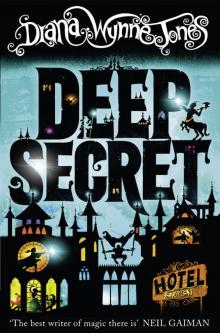 Deep Secret
Deep Secret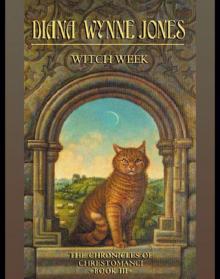 Witch Week
Witch Week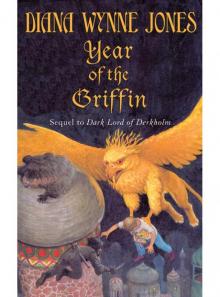 Year of the Griffin
Year of the Griffin Wild Robert
Wild Robert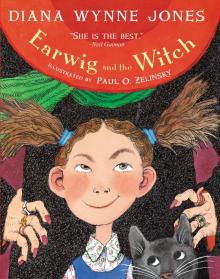 Earwig and the Witch
Earwig and the Witch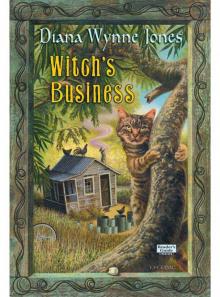 Witch's Business
Witch's Business Dogsbody
Dogsbody Caribbean Cruising
Caribbean Cruising Cart and Cwidder
Cart and Cwidder Conrad's Fate
Conrad's Fate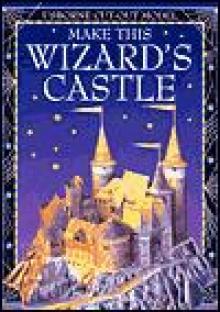 Howl's Moving Castle
Howl's Moving Castle The Spellcoats
The Spellcoats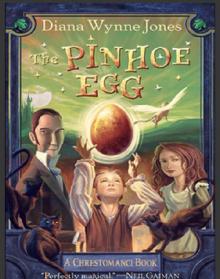 The Pinhoe Egg
The Pinhoe Egg Drowned Ammet
Drowned Ammet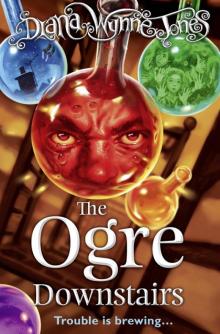 The Ogre Downstairs
The Ogre Downstairs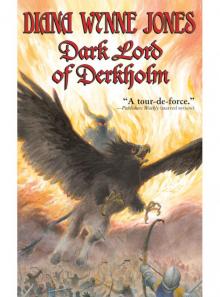 Dark Lord of Derkholm
Dark Lord of Derkholm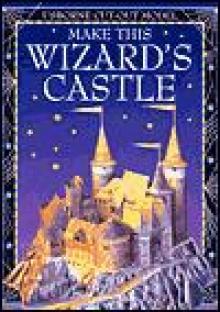 Castle in the Air
Castle in the Air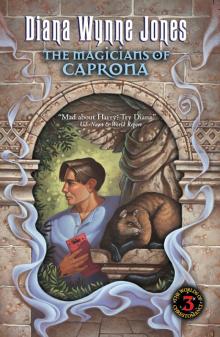 The Magicians of Caprona
The Magicians of Caprona A Tale of Time City
A Tale of Time City The Lives of Christopher Chant
The Lives of Christopher Chant The Magicians of Caprona (UK)
The Magicians of Caprona (UK)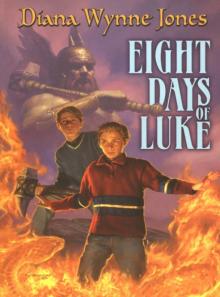 Eight Days of Luke
Eight Days of Luke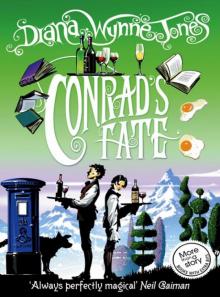 Conrad's Fate (UK)
Conrad's Fate (UK)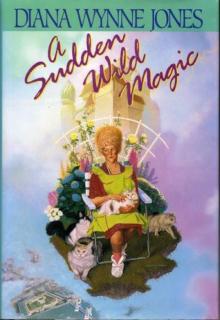 A Sudden Wild Magic
A Sudden Wild Magic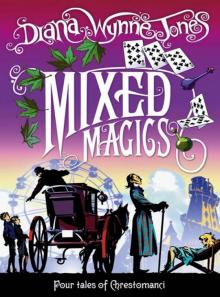 Mixed Magics (UK)
Mixed Magics (UK)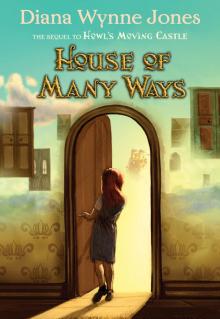 House of Many Ways
House of Many Ways Witch Week (UK)
Witch Week (UK)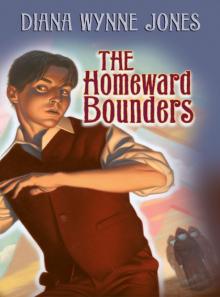 The Homeward Bounders
The Homeward Bounders The Merlin Conspiracy
The Merlin Conspiracy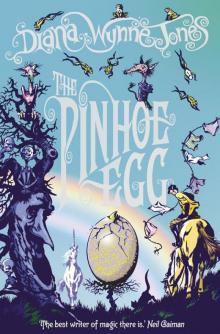 The Pinhoe Egg (UK)
The Pinhoe Egg (UK)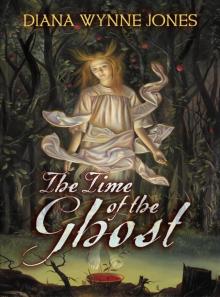 The Time of the Ghost
The Time of the Ghost Hexwood
Hexwood Enchanted Glass
Enchanted Glass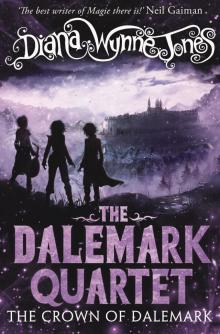 The Crown of Dalemark (UK)
The Crown of Dalemark (UK)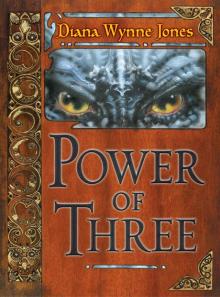 Power of Three
Power of Three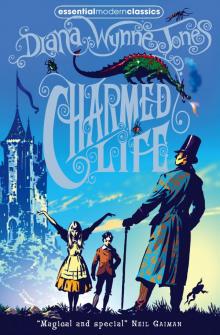 Charmed Life (UK)
Charmed Life (UK)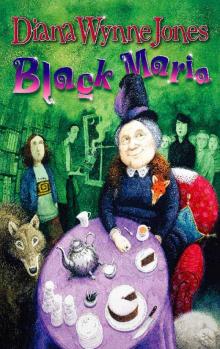 Black Maria
Black Maria The Islands of Chaldea
The Islands of Chaldea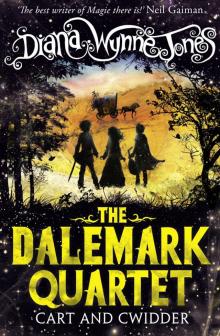 Cart and Cwidder (UK)
Cart and Cwidder (UK) Drowned Ammet (UK)
Drowned Ammet (UK) Charmed Life
Charmed Life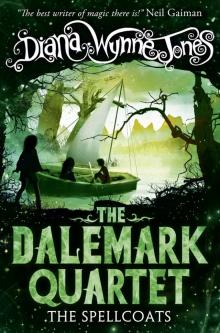 The Spellcoats (UK)
The Spellcoats (UK)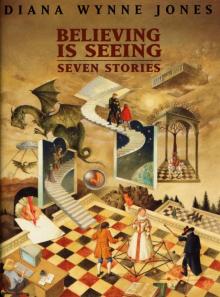 Believing Is Seeing
Believing Is Seeing Samantha's Diary
Samantha's Diary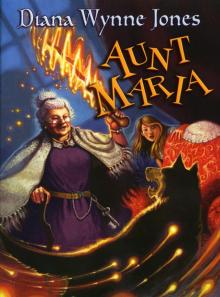 Aunt Maria
Aunt Maria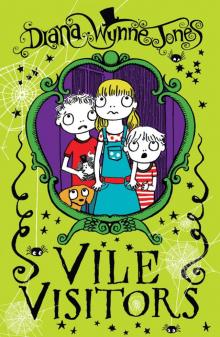 Vile Visitors
Vile Visitors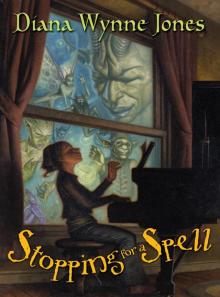 Stopping for a Spell
Stopping for a Spell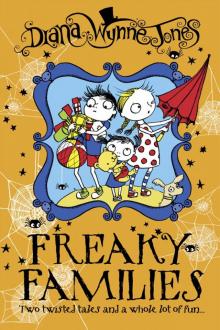 Freaky Families
Freaky Families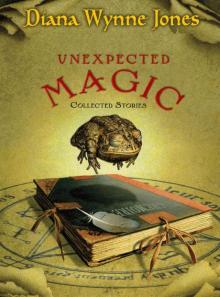 Unexpected Magic
Unexpected Magic Reflections
Reflections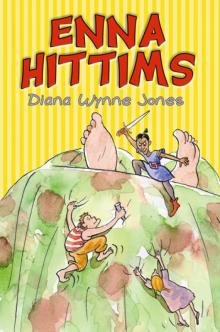 Enna Hittms
Enna Hittms Mixed Magics: Four Tales of Chrestomanci
Mixed Magics: Four Tales of Chrestomanci